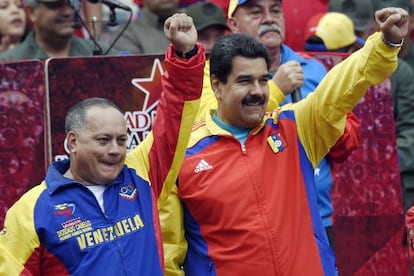Venezuela grants Maduro special powers in national security issues
Lawmakers vote to allow president to rule by decree until end of year to tackle US sanctions

Venezuelan lawmakers on Sunday gave President Nicolás Maduro special decree powers over national security issues as tensions rise with the United States over the jailing of opposition leaders in Caracas.
With the approval, Maduro will be able to introduce new laws or change existing legislation in areas that deal with “liberty, equality, international peace and justice, independence, sovereignty, immunity, territorial integrity, and national self-determination.”
The president will be able to use the decree powers until December 31, the National Assembly said.
Maduro’s petition comes after days of tensions with the United States following President Obama’s March 9 executive order extending sanctions against six Venezuelan government officials and a prosecutor, who have been accused by Washington of corruption and committing rights violations against the opposition.
Washington had already slapped visa sanctions against a group of Venezuelan officials and their families in February.
On Saturday, Venezuelan military contingents, as well as citizen militia groups created by the late President Hugo Chávez, began taking part in defense exercises in preparation for a possible US invasion.
“Here are the special powers so you can legislate to defend sovereignty and the homeland,” said National Assembly speaker Diosdado Cabello as he handed Maduro the new law approved by lawmakers after a two-hour session.
Maduro had asked the National Assembly last week to grant him the special powers under a so-called Anti-Imperialism Enabling Act.
The new law is seen as a trophy for Maduro who is determined to exploit the tensions with Washington to consolidate his internal power. It will enable him to sidestep many laws that could be passed by a new National Assembly to be empaneled following legislative elections this year – polls say the opposition is expected to win the race.
Maduro’s United Socialist Party of Venezuela (PSUV) and his allies currently hold the majority in the assembly.
The special decree is seen as a trophy for Maduro who will be able to consolidate his internal power
Under the pretext of a possible US invasion, the government called out 80,000 troops and 20,000 civil militia members to take part in training exercises until March 28. The Venezuelan Defense Ministry showcased its newly acquired Russian- and Chinese-made armaments, including tanks and weapons.
Ministry officials said military observers from Russia were also present.
On Saturday, Maduro took part in a march in the Nicaraguan capital, Managua, organized by President Daniel Ortega to show his nation’s support and solidarity with Venezuela. The Venezuelan leader said he was calling together members of the Bolivarian Alliance for the Peoples of Our America (ALBA) for a meeting in Caracas on Tuesday to discuss Washington’s latest moves and take a common position, which will be presented at the 7th Summit of the Americas in Panama City next month.
In another development, the Union of South American Nations (Unasur) called on the United States to stop applying “unilateral coercive measures that go against international law.”
Tu suscripción se está usando en otro dispositivo
¿Quieres añadir otro usuario a tu suscripción?
Si continúas leyendo en este dispositivo, no se podrá leer en el otro.
FlechaTu suscripción se está usando en otro dispositivo y solo puedes acceder a EL PAÍS desde un dispositivo a la vez.
Si quieres compartir tu cuenta, cambia tu suscripción a la modalidad Premium, así podrás añadir otro usuario. Cada uno accederá con su propia cuenta de email, lo que os permitirá personalizar vuestra experiencia en EL PAÍS.
¿Tienes una suscripción de empresa? Accede aquí para contratar más cuentas.
En el caso de no saber quién está usando tu cuenta, te recomendamos cambiar tu contraseña aquí.
Si decides continuar compartiendo tu cuenta, este mensaje se mostrará en tu dispositivo y en el de la otra persona que está usando tu cuenta de forma indefinida, afectando a tu experiencia de lectura. Puedes consultar aquí los términos y condiciones de la suscripción digital.








































